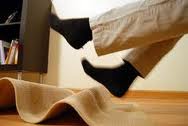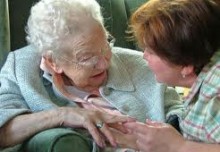 About one in five adults over the age of 65 will fall in their homes during the course of a year, and for some this will be part of an inevitable decline in their abilities to care for themselves and stay in their homes independently. Because this is Home Safety Month, I wanted to share four geriatric care management perspectives with you that can help you to make home safer from falls, especially if you are a caregiver to an older adult or anyone else with special needs.
About one in five adults over the age of 65 will fall in their homes during the course of a year, and for some this will be part of an inevitable decline in their abilities to care for themselves and stay in their homes independently. Because this is Home Safety Month, I wanted to share four geriatric care management perspectives with you that can help you to make home safer from falls, especially if you are a caregiver to an older adult or anyone else with special needs.
- Gait and Balance. As an elder care manager, I am always assessing the health and well-being of our older clients, but this is not limited to their medical status. As a person grows older, they also become less nimble, their muscles are not as strong and their movement becomes stiffer. If you are a caregiver, you may not notice the subtle changes from day to day in your older loved one, but older adults progress from a walk towards more of a shuffle. The shuffle is what will increase an older adult’s fall risk. Their shoes may catch the edge of a threshold or get caught in a worn patch of the carpet. Work with your older loved one to maintain a level of physical activity that helps keep their feet fit.
- Household Hazards. In other postings, I have talked about the trip risks posed by footstools, worn carpet, slippery scatter rugs, uneven or wet surfaces, stairs, electrical or other cords and similar obstacles on the floor. While you need not become the interior design architect or housekeeper, it is helpful to do a periodic “environmental assessment” to identify and correct risks before they become a shattered hip.
- Vision Issues. As your loved one grows older their vision inevitably becomes less acute, but sight also can be obscured by cataracts, macular degeneration or astigmatism. In addition to seeing that your older loved one gets their vision tested regularly, you also can help by installing higher wattage bulbs in areas of the house prone to shadows or in the entryways where your loved one may be coming in from a nighttime darkness or from the bright midday light into the darkness of home. Also have lamps within easy reach of bed for nighttime risings.
- Medication Issues. Many medications have common side effects like dizziness, vertigo or blurred vision. Make certain you have a complete list of medications your loved is taking so that you can ask their health care provider about any side effects. You may have seen labels on drugs that caution against “operating heavy machinery,” but there are a lot more side effects that are listed on the package inserts of these medicines. And probe the provider about the potential for interactions among the drugs which can cause their own added balance issues.
Charlotte Bishop is a Geriatric Care Manager and founder of Creative Care Management, certified professionals who are geriatric advocates, resources, counselors and friends to older adults and their families in metropolitan Chicago. Please email your questions to ccbishop@creativecasemanagement.com.





